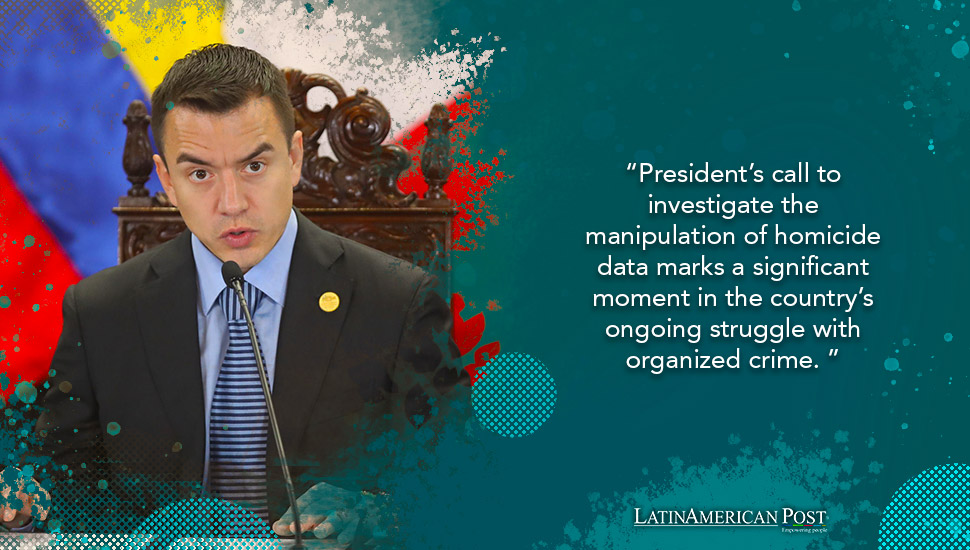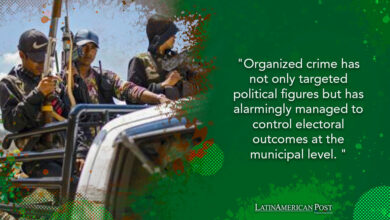Ecuador’s Hidden Homicide Crisis: The Impact of Manipulated Crime Data

As Ecuador grapples with a soaring homicide rate, President Daniel Noboa has called for an investigation into the alleged manipulation of crime statistics by past administrations, revealing a decade of unchecked violence, corruption, and systemic failure in the fight against organized crime.
President Daniel Noboa’s call to investigate the manipulation of homicide data by previous Ecuadorian governments marks a significant moment in the country’s ongoing struggle with organized crime. The decision came after a damning report by University of Chicago researcher Arduino Tomasi, which suggested that more than 7,700 homicides were misclassified as “undetermined deaths” during the presidency of Rafael Correa (2007–2017). The allegations point to a deliberate cover-up intended to downplay Ecuador’s rising violence and project an image of control and stability.
The potential concealment of such a large number of homicides has prompted a national debate, forcing Ecuadorians to confront the reality of their country’s crime crisis. Noboa’s investigation spans the administrations of Correa, Lenín Moreno (2017–2021), and Guillermo Lasso (2021–2023), raising questions about whether there was a coordinated effort to hide the true extent of the violence caused by organized crime.
The implications of these findings are profound. If it is confirmed that thousands of murders were systematically concealed, Ecuador’s understanding of its crime problem will be reshaped. What was once seen as a relatively safe nation in the context of Latin America now finds itself in the grip of one of the region’s worst homicide crises, with a staggering rate of 47.2 homicides per 100,000 inhabitants recorded in 2023. The cover-up allegations highlight not just the violence but also the deep-rooted corruption that has plagued the country’s institutions.
The Manipulation of Homicide Data
The manipulation of crime statistics under Correa’s administration paints a grim picture of how political priorities can lead to the erosion of public trust. During Correa’s presidency, Ecuador was often praised for its stability and low crime rates, positioning the country as a model of governance in the region. However, Tomasi’s report suggests that the government was able to maintain this image by misreporting violent deaths as “undetermined causes,” a classification that obscured the actual level of violence. This tactic allowed Correa to preserve his administration’s reputation while deteriorating the country’s security.
President Noboa has wasted no time in addressing these revelations. He has ordered the National Institute of Statistics and Census (INEC) to conduct an internal audit to uncover the truth behind the alleged data manipulation. Noboa has also requested the Prosecutor’s Office to investigate the possibility of public document falsification during Correa’s presidency, focusing on Pablo Aníbal Izquierdo, a former health advisor overseeing the classification of homicide data.
The gravity of these accusations cannot be understated. If proven true, the intentional misreporting of thousands of homicides represents a profound breach of public trust and underscores the extent of corruption within Ecuador’s government. For years, Ecuadorians were led to believe that their country was safer than it indeed was, all while criminal organizations expanded their power and influence.
Rising Violence and the Surge in Homicides
The scandal surrounding manipulated crime statistics comes amid an unprecedented surge in violence. The year 2023 was the most violent in Ecuador’s history, with over 3,000 homicides reported by mid-year. Organized crime, fueled by the drug trade, has escalated to new levels, with criminal groups asserting control over critical cities like Guayaquil and Esmeraldas. In these areas, armed gangs engage in turf wars, leaving ordinary citizens caught in the crossfire.
Recent high-profile murders have shaken the country, underscoring the dangerous power wielded by criminal organizations. The assassination of Fernando Villavicencio, a prominent presidential candidate, in August 2023 was a shocking reminder of how deeply crime has infiltrated Ecuadorian politics. Villavicencio was killed in broad daylight during a campaign rally, a brazen act of violence that sent shockwaves through the nation.
Villavicencio’s murder was not an isolated incident. Criminal organizations have increasingly targeted public figures to intimidate those who stand in their way. The rise in femicides, with 321 women killed in 2023, also highlights the diverse forms of violence plaguing Ecuador. Women, often caught between domestic violence and gang-related killings, are particularly vulnerable in this climate of fear.
The violence has spilled into the country’s already overcrowded prison system. In 2023, a series of deadly riots in Guayaquil’s prisons claimed the lives of over 100 inmates as rival gangs fought for control of the facilities. The riots highlighted the lack of government control over the prison system, where criminal groups often operate with impunity.
Noboa’s Fight for Justice and Accountability
Since taking office in late 2023, President Daniel Noboa has clarified that addressing Ecuador’s security crisis is a top priority. Early in his presidency, Noboa escalated the fight against organized crime by declaring an “internal armed conflict.” By categorizing criminal groups as terrorist actors, Noboa’s government has justified the use of military force to combat them. The military has been deployed to take control of prisons, and operations have been launched to dismantle drug trafficking networks.
Noboa’s commitment to transparency and accountability has also been central to his administration’s approach. The decision to investigate the manipulation of homicide data is part of a broader effort to expose the corruption that has allowed Ecuador’s crime epidemic to spiral out of control. Noboa has vowed to pursue “justice, truth, and reparation,” promising Ecuadorians that his government will not shy away from uncovering the truth, no matter how damaging it may be for political figures from previous administrations.
While Noboa’s administration has reported a 17% decrease in violent deaths in 2024, the overall security situation remains dire. Kidnappings and extortion continue to plague Ecuador’s urban centers, where criminal organizations maintain a stranglehold on local communities. Noboa’s militarized approach has yielded some results, but the long-term success of his efforts will depend on addressing the deeper socio-economic issues that fuel organized crime.
The Path to Justice
Ecuador’s struggle against organized crime is far from over. President Daniel Noboa has taken significant steps to confront the country’s violent past and hold those responsible for manipulating crime data accountable. However, the road ahead is fraught with challenges. Ecuador’s position as a critical transit point for drug trafficking, combined with the entrenched power of criminal organizations, means that the fight for justice will be long and difficult.
The upcoming 2025 elections will be a critical moment for Ecuador. As Noboa seeks re-election, he will face strong opposition from the political movement led by former President Correa. The Revolución Ciudadana continues to promote the narrative that crime rates were significantly lower during Correa’s tenure, a claim now thrown into question by the allegations of data manipulation. The battle for public perception will intensify, with Noboa positioning himself as the candidate for transparency and accountability.
Despite the political tensions, many Ecuadorians are rallying behind Noboa’s efforts to confront the country’s crime epidemic. His willingness to tackle corruption head-on and demand accountability from previous administrations has struck a chord with a population weary of government deceit.
Confronting a Crisis
Ecuador’s hidden homicide crisis, exposed by the alleged manipulation of crime statistics, has forced the country to confront its past failures in addressing organized crime. President Daniel Noboa’s decision to investigate these allegations marks a turning point in Ecuador’s fight for justice and transparency. As the country grapples with rising violence and the influence of criminal organizations, Noboa’s commitment to uncovering the truth offers a glimmer of hope for a better future.
Also read: Power Struggle in Ecuador Amid Election Uncertainty is a Threat to Democracy
With over 3,000 homicides already recorded in 2024, the fight against organized crime remains one of Ecuador’s most pressing challenges. The revelations of manipulated crime data underscore the need for a government prioritizing accountability and transparency. While the road ahead is uncertain, Noboa’s determination to hold past administrations accountable may be the first step toward a more secure and just Ecuador.





